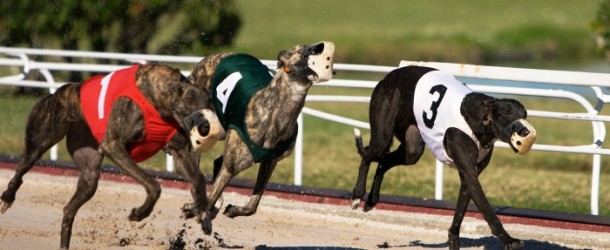Article by: Irvin Cannon
Tens of thousands of greyhounds are bred every year for the 27 racetracks in the United States, according to the U.S. Humane Society. They’re intentionally over-bred so there will be ample to replace old and underperforming greyhounds at the tracks. Each year, thousands of these retired dogs do not find a home; they are killed.
 “These dogs have feelings and intelligence, but they are treated like racing slaves so people can gamble,” says retired police officer Irvin Cannon, a dog lover whose book, For the Love of Dog Tales, gives voice to man’s best friend. “Who is the winner in this scenario?”
“These dogs have feelings and intelligence, but they are treated like racing slaves so people can gamble,” says retired police officer Irvin Cannon, a dog lover whose book, For the Love of Dog Tales, gives voice to man’s best friend. “Who is the winner in this scenario?”
The Humane Society estimates thousands of retired racing dogs are put to death every year. Rabbits are another industry victim; thousands are maimed or killed in the race-training process.
Cannon says there are some things to remember for those considering adopting a greyhound:
• They typically don’t have issues associated with abuse: Greyhounds may not get a lot of love in the kennels, but are not often abused by track personnel. They tend to respond to fear and violence by either freezing in place or running. Since they are trained to chase rabbits, they may be inclined to pursue small running animals.
• Greyhounds tend to be intelligent, timid: These dogs are considered gentle and reserved, but stubborn. If they sense they can take control, they will, so owners should quickly establish authority.
• Not used to other breeds: Greyhounds are born and raised around people and other greyhounds only. They may become confused or frightened by other dogs, and may need to get accustomed to cats.
• No fat, little hair: No dog should be left outside in the cold or heat. Greyhounds are especially sensitive to extreme temperatures and rain.
• Sweet affection: They do not bite; they show affection by licking, leaning and rubbing, much like cats.
Although there is a well-known and dedicated effort to find homes for aged-out greyhounds, Cannon said there is only one way to fix the racing industry – it must be ended. There are several national and international groups trying to put a stop to greyhound racing and gambling, including the Humane Society, and People for the Ethical Treatment of Animals. Until then, Cannon hopes these gentle dogs find homes.
“When you adopt a needy canine, you won’t find a better companion,” he says,“ whether you bring home a greyhound, a mystery mixed-breed or a purebred Labrador.”
 About Irvin Cannon
About Irvin Cannon
Irvin Cannon was a poor kid growing up in Detroit when his family took in a stray dog. It surprised young Irvin that his father would be willing to share the family’s meager groceries with a dog, but he soon discovered the return on their investment was enormous. A former police officer in Detroit and Denver, he also worked as a corrections officer.
Header image of racing greyhounds courtesy of Flickr’s The Commons

Though some greyhounds do splendidly with cats or small dogs, many, maybe even most, have too strong a prey drive to be trusted around them, or their cat-status is unknown. A greyhound should not be matched with an adopter with small dogs or cats unless the rescue group has tested the greyhound and found it safe. If a greyhound is placed with a family with small pets and has not been tested, the greyhound should wear a muzzle and be supervised until it is very clear there is not a prey response. And a greyhound who is safe with the family cat or small dog inside the house may find that same animal in the yard to be too tempting. And remember, a greyhound’s responses are lightning fast. Better safe than sorry.
Aside from that, greyhounds make the most awesome companion animals, and adopters have a unique experience among dog-owners: teaching a seasoned running machine to be a dog.